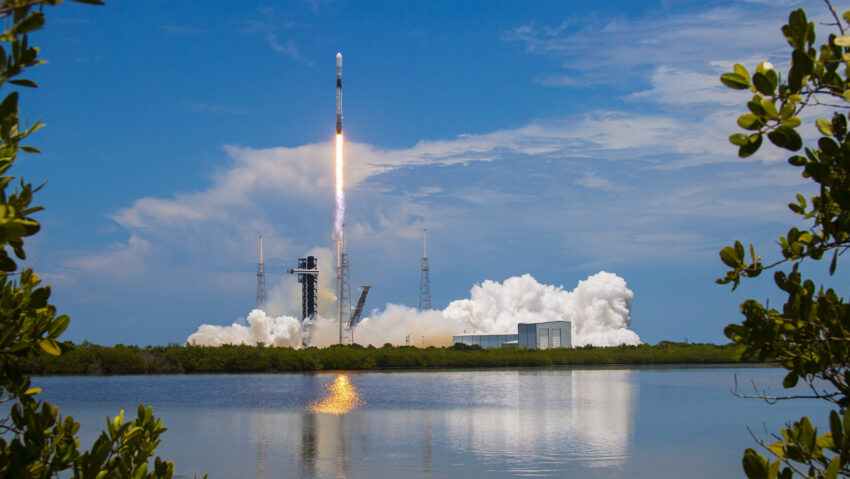U.S. Space Force’s Space Systems Command (SSC) and Space Operations Command (SpOC), successfully launch a Global Positioning System (GPS) M-code satellite into orbit as part of the GPS III-7 mission on a SpaceX Falcon 9 rocket from Space Launch Complex 40 (SLC-40), Cape Canaveral Space Force Station, Florida, May 30, 2025. (Photo courtesy of SpaceX)
WASHINGTON — The Space Foundation’s annual report shows that the global space economy hit “an unprecedented” $613 billion in 2024, growing 7.8 percent from $570 billion in 2023 — with military space spending rising slightly to $60.9 billion from $57 billion in 2023.
“For the first time ever, the global space economic number exceeds $600 billion and it now sits at $613 billion,” Space Foundation CEO Heather Pringle said Tuesday at the Innovate Space: Global Economic Summit, sponsored by the foundation and Amazon.
“There are a lot of good reasons why space is seeing this consistent positive trend of growth, and first and foremost is because space as a capability is not discretionary. Every swipe, tap and left turn that y’all take with your mobile devices is due to space capabilities,” she said. “But more importantly, launch is another linchpin for space capabilities, and we’re seeing declining launch costs as well as reusability, which is opening new use cases and opportunities for the overall space economy to grow.”
The Space Report 2025 Q2 covers the commercial, civil and national security space sectors in 53 countries, and is based on more than 50 sources of 2024 economic data, Pringle explained.
The report shows that one of the drivers for the recent growth in the sector is the rise in spending on national security space outside the United States. Non-US military space spending has jumped a whopping 76.5 percent over the last five years to $11.38 billion.
“Additional factors driving space sector growth include efforts by nations around the world to develop sovereign military space capabilities. European and Asian countries have pledged to develop domestic military space programs amid regional conflicts and the growing need for independent launch capabilities,” according to a Space Foundation press release.
US national security space spending also increased in 2024, the report shows, rising to $49.58 billion from $45.98 billion in 2023 — dwarfing the rest of the world. The 2024 sum represents nearly a 56 percent increase from the 2020 level of $27.7 billion, and that upward trend is only expected to continue.
“U.S. military spending on space was poised for rapid growth, with increased spending on programs including the proposed Golden Dome missile shield. Signed into law on July 4, the One Big Beautiful Bill authorized a $25 billion initial investment in the Golden Dome and allocated another $500 million to improve military space launch infrastructure,” the press release notes.
That said, the real engine behind the worldwide space boom is the continued explosion of commercial space revenue rather than government spending.
“The report found the commercial sector accounted for 78 [percent] of the global space economy, with government budgets contributing the remaining 22 [percent]. Government space spending grew 6.7 [percent], to reach $132 billion, with the United States investing $77 billion in national security and civil space programs,” the release says.
The new report further “highlights the record pace of space launch in the first half of 2025, with a liftoff to orbit every 28 hours from Jan. 1 to June 30 — six hours faster than the annual record set in 2024.”
Most of those launches were by SpaceX, with its 81 launches accounting for “more than half of the world’s 149 launches” during that time frame.
The majority of satellites launched during that time frame were for broadband communications in low Earth orbit to provide internet connectivity — namely SpaceX’s Starlink birds, but also Amazon’s Kuiper and Eutelsat’s OneWeb satellites.
Finally, the foundation report predicts that the commercial Earth observation market also is “poised for rapid growth.”
Click this link for the original source of this article.
Author: Theresa Hitchens
This content is courtesy of, and owned and copyrighted by, https://breakingdefense.com and its author. This content is made available by use of the public RSS feed offered by the host site and is used for educational purposes only. If you are the author or represent the host site and would like this content removed now and in the future, please contact USSANews.com using the email address in the Contact page found in the website menu.








